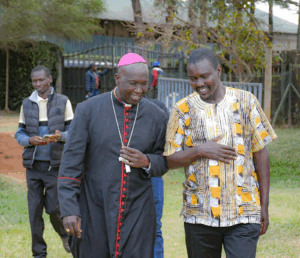Court Orders Continued Medical Care and Second Mental Test for Murder Suspect.
If the report concludes that the accused is mentally fit, the prosecution will proceed with the trial on charges of murder.

Kalombotole is kept in remand custody pending the assessment and ensuing court hearing. Photo /courtesy.
By Ruth Sang
High Court Judge Justice Kavedza instructed the prison officials to see to it that the accused, Kalombotole, received proper medical care for his diabetes and whatever other medical complications he may have while in custody. This was instructed to make sure the suspect’s health is taken care of as the legal process continues.
Justice Kavedza underscored the necessity of ensuring regular medical care for the accused, indicating that detention should not obstruct the right to receive healthcare. The order by the judge ensures that the prison authorities keep the medical condition of the accused in check and provide treatment in time as and when it is required.
The State of Kenya, represented by the Senior Assistant Director of Public Prosecutions, Gikui Gichui, explained to the court that the suspect requires another psychological examination in an effort to analyze the suspect’s psychological and mental conditions. With this, the court will be in a position to determine whether the accused is fit to stand trial and comprehend the nature of the charges brought against them.
In the opinion of the prosecution, it is necessary to have a second psychiatric examination to confirm that there are fair legal and medical standards in the trial of the suspect. The prosecution claimed that the results of this test will decide whether the court will listen to full formal murder charges.
The issue comes up for mention on November 13, 2025, when the court will hear the report of the mental health examination. Justice Kavedza will then determine if the accused is fit to enter a plea and be charged with murder.
Kalombotole is kept in remand custody pending the assessment and ensuing court hearing. The judge’s decision also illustrates the judiciary’s ongoing interest in upholding suspects’ rights to fair treatment, such as access to medical care and psychological assessment.
Legal professionals note that psychiatric examinations of murder suspects are a standard procedure under Kenyan legislation, and they are conducted to safeguard the rights of the accused as well as maintain integrity in the judicial process. If the report concludes that the accused is mentally fit, the prosecution will proceed with the trial on charges of murder. However, if found unfit, the court may order additional treatment or postpone the trial until the accused is in good mental health.
The future reference on November 13 will therefore be a defining moment in learning the way the case unfolds, with the court attempting to balance justice, due process, and the well-being of the accused.







